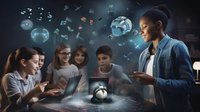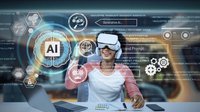Lots of people in the education sector are concerned about student’s imaginations. Folks like Sir Ken Robinson have stated that “My contention is that creativity in education now is as important as literacy.”
Robinson tells wonderful stories about creativity and making education a task of education the “whole being,” but what is imagination? We need to be interested in this because the whole of educational institutions are engaged in an evolution and digital transformation. Wouldn’t it be nice to take it a bit further and ensure a complete turn-about when it comes to enhancing creativity and imagination?
Already a great number of companies have landed on the scene like 2gno.me which is all about “knowing me” as an individual learner, and others like Leaps focusing on social emotional skills and more. These are sure evidence that a sixth sense about the importance of these ideas is swelling.
For one thing, in teaching we can all agree that symbols, those language and mathematical representations, are not the idea or thing itself. They are just the way to communicate the concept. Yet we emphasize the symbols a lot in schools, but not always the sense of the idea. We test and assess the symbols and not always the inference.
From symbols-aren’t-the-concept, we can narrow down creativity and imagination by saying what inhibits having free-form ideas in the first place, without attachment to symbols. This is simple, it’s the fear of being wrong. What makes you feel wrong is when you “don’t know” and others, perhaps a teacher or parent, “knows.” When you “don’t know” you are wrong. To be right, you need to “know.” Guessing won’t do, in many instances, and is actively discouraged as you grow older. Kindergarteners can get away with knowing that dinosaurs still roam the earth and telling fanciful stories about one that ate their cat. The first frown of discouragement, kills this lack of inhibition, this creativity and imagination, flat. It is “wrong.” It’s a fib, a lie even.
But what if it wasn’t? What if it there were a fact that what is true for you is always “true,” even if it is only for you? In your alternate world it really happened, you saw it through some combination of mental images embellished by your imagination, of your plastic dinosaur and your cat and something you saw in a movie, out-sized and animated together creatively? What if it is true that your construction of the world, while potentially in disagreement with others, is still “true” and what you “know?” Maybe you did see that dinosaur eat the cat by combining real world images with flights of fancy to create some hybrid experience you saw, like dreaming? This is the crux of imagination versus real world, and when emphasizing the real, the symbols we can see, we sacrifice the imagination.
Query and Validation is Key
Well, we can’t be raising or teaching kids total lack of differentiation between the two, because that could result in horrific consequences, obviously. Yet we can query where and how creativity was in play and validate the parts where the plastic dinosaur grew to enormous proportions and then gobbled the cat, how did that happen? Oh, your mind sort of “blew it up” large and then a lot of action happened with the cat getting gone? The fact that your mind can do that is extraordinarily great! What other things can you imagine? Wow!
In this way, we point out the fact that imagination, creativity, is like magic. It makes something out of nothing, essentially. The mind is that powerful. It goes beyond the real. It is constructive, and is its own sort of knowledge. It is a skill. Unlike our hands that operate in the physical real world to tie shoe laces, our minds operate beyond it. Our minds do things to first build possibilities, play with them, and often then organize the thoughts to get them executed in the real world like architecture. Our minds are the genesis of the real.
When you see that this is true, for yourself, that you are in fact creative and imaginative, you might also realize something of quintessential importance about knowledge. To “know” something is to grasp it with full conceptual understanding, a sort of spanning of the attention across some idea and an absorption, an acceptance of it. This means the imagination must be engaged, that capacity for making something out of nothing, giving it form and significance, whatever the concept or symbol might be, and letting it come to roost permanently in our minds, a solidity out of the nothing.
In other words, to “know” some fact or symbol at all we must at some level, create the concept ourselves.
This logically means we already have the capacity for that distillation of the concept, it is already in us.
Perhaps what this really means, down underneath the facts being taught by any teacher or courseware, is that “knowing” is the root capacity of any mind, an already inherent ability. It means we already “know” and facts are just placed on this foundation. This is a reverse of what we think is happening, obviously. But it bears some consideration, this idea that we are born already knowing just about everything. Across all of humanity every teenager certainly knows everything, don’t they? It’s something to think about.
In fact, many life-forms in the animal kingdom are born with habits and observable knowledge without ever reading a book. There is an apparent species-wide pre-encoded knowledge. Why not something on a far greater scale for humans, with some sentience far exceeding animals?
What great gains could be had if we all believed that teaching facts and observations and extrapolations, is not a transfer but an uncovering, on a certain level. All knowledge is already there, in the learner. It just has to be coaxed to the surface.
What’s fun and perhaps revolutionary for learning about this idea is this:
If we believe students already “know,” and we are just helping them find that they do, all elements of right versus wrong take flight. They are already right, we as educators and parents are merely hand-holders and encouragers of their brilliance. A low grade or low mark merely means the learner hasn’t found what they already know, but it’s somewhere in their cosmic consciousness, waiting.
Let’s have a grand experiment in not killing creativity. Let’s start with this lovely idea that every student already knows everything from all of time and any future. Let’s play pretend.
When we do, our manner of teaching might just transform all learning, and our software systems commensurately evolve for uncovering the “know” already there.










